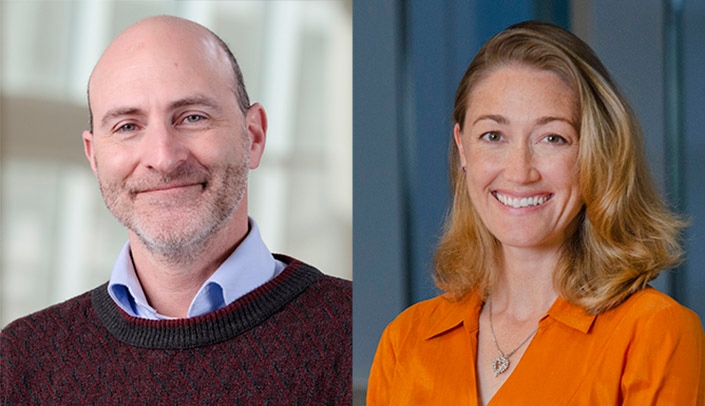Jana Broadhurst, MD, PhD, assistant professor of pathology and microbiology in the UNMC College of Medicine, and David Brett-Major, MD, MPH, professor of epidemiology in the UNMC College of Public Health, recently taught a weeklong virtual class on emerging infectious diseases, zoonosis and tropical medicine for the University of Global Health Equity (UGHE) in Rwanda.
The class was the result of an effort by Senior Vice Chancellor of Academic Affairs Dele Davies, MD, and John Lowe, PhD, executive director of education for the Global Center for Health Security. The UNMC leaders visited UGHE, which has a relationship with the University of Nebraska-Lincoln, earlier this year.
“While they were there, it was clear that there were some curriculum needs in medicine and public health,” said Dr. Brett-Major, who holds a master’s in public health with a focus on tropical public health. “They came back, scouted the faculty to see if there was interest in teaching a course, and Dr. Broadhurst and I said yes.”
In fact, the chance to engage with African and Asian at-risk community institutions was one reason Drs. Broadhurst and Brett-Major each joined UNMC within the past year.
“Dr. Lowe has really been pushing with Dr. (James) Lawler and others at the Global Center for these longitudinal, bilateral relationships, to make sure that when engagements happen, that there is impact and the engagements build on each other,” Dr. Brett-Major said. “When my dean, Dr. Ali Khan, learned about this, that was his first question . . . if you are going to do this, how is it going to be worthwhile beyond a one-off event?”
Dr. Lowe said the partnership with UGHE exemplifies the mission of the Global Center for Health Security to advance health systems worldwide.
“UGHE is training the next generation of physicians and public health experts for the African continent, so we were thrilled that Drs. Brett-Major and Broadhurst, two of our world-class experts, were not only interested in teaching at UGHE but up for the challenge of teaching remotely throughout the night due to the global pandemic.”
The teaching commitment originally would have had Drs. Brett-Major and Broadhurst traveling to Rwanda.
“We were not only going to be teaching this, we were going to be scoping some curricular activities that we might be doing in the future for a variety of graduate programs and other, larger public health/health security requirements that they have as a university and health actor in their region,” Dr. Brett-Major said. “We were going to be scouting research opportunities, as well. But then COVID-19 happened.”
COVID-19 caused a bit of a shift in the curriculum, as well, Dr. Broadhurst said, although the “bread-and-butter” of the course would have been the same without COVID-19.
“There were some special topics highlighted that brought to bear some of the take-home lessons for inpatient care and also how patients engage with public health structures in the context of outbreak response and pandemic response,” she said.
“During the curriculum, we were asked to give a three-hour, ‘broaden-your-horizons’ seminar, and we chose severe acute respiratory infections as the focus area, in part because they have so much contemporary experience with COVID-19 and SARS-CoV-2,” Dr. Brett-Major said.
Dr. Broadhurst, who completed tropical medicine postgraduate training at the Liverpool School of Tropical Medicine, said the course had a practical focus and material tailored to be most relevant for the health care settings in which the Rwandan students are likely to practice.
Drs. Broadhurst and Brett-Major also taught the weeklong course on Rwandan time, which meant most interactions took place between 1 and 8 a.m.
“We’ve essentially been doing double shifts — drinking a lot of coffee and sleeping during the lunch hour,” Dr. Brett-Major said with a laugh. “But for us, this was one of the reasons we came to Nebraska — to work with the Global Center and the Colleges of Medicine and Public Health to do this kind of work.”
